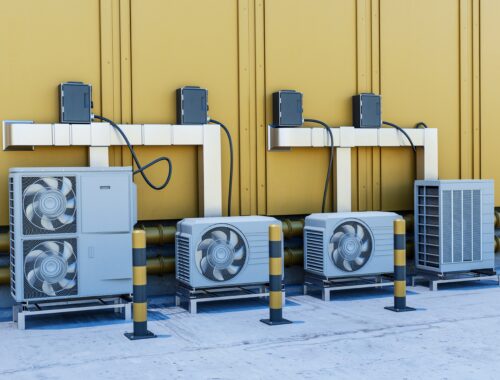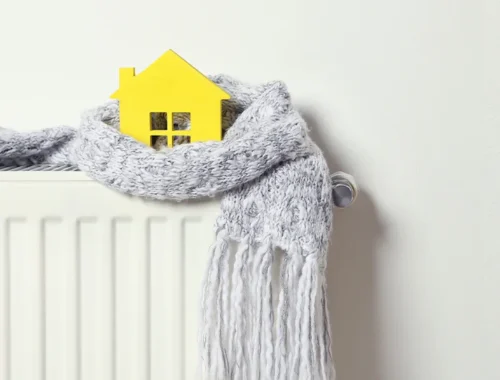Heating, ventilation and air conditioning (HVAC) systems are of great importance, as they play a significant role in regulating air quality, temperature and moisture. Special attention is required, especially when choosing an HVAC system for commercial areas.
In this article, we will explore the principles of HVAC systems, focus on their importance and common challenges in commercial spaces. We will also provide tips for choosing the right HVAC system and discuss maintenance best practices.
What Is an HVAC System?
Heating, ventilation and air conditioning (HVAC) systems regulate and circulate heated and cooled air in residential and commercial buildings. In other words, an HVAC system takes in air, cools or heats that air, and forces it into a space. This space can be a single room or an entire building, such as a home, office, school, airport, etc. HVAC systems can also control humidity levels and improve air quality. While there are many options when it comes to HVAC systems, they all operate in the same way.
The Importance of HVAC Systems in Commercial Spaces
In commercial spaces, HVAC systems are of great importance because they provide comfort to a large number of people, including employees and customers, improve air quality, and contribute to safety. Quality systems, if properly maintained, also reduce energy consumption. In some industries, such as grocery stores, a proper air conditioning system plays a major role in maintaining the quality of goods.
Tips for Choosing the Right HVAC System
Choosing HVAC systems for commercial spaces requires special attention and consideration of various factors. First of all, it is necessary to take into account the size and characteristics of the area, temperature, humidity, and the types of systems.
Key Components of Commercial HVAC Systems
A. Heating Systems
1. Types of Commercial Heating Systems
Choosing a specific type of heating system depends on location, space requirements, budget, energy efficiency, and other factors.
- Forced Ventilation: This system actively utilizes fans to ensure continuous air circulation in a space. This technology effectively removes polluted air and supplies fresh air, contributing to maintaining high indoor air quality in buildings.
- Central Heating systems: Widely used in various types of buildings, such as offices, shops, apartments, and industrial facilities. They provide centralized control and can be effective in large buildings.
- Heat Pumps: Becoming increasingly popular due to their energy efficiency and ability to utilize the surrounding environment for heating. They are well-suited for various types of buildings, especially in regions with a moderate climate.
2. Efficiency and Energy Considerations
It is important to note that modern systems are produced taking into account energy efficiency, which is also facilitated by regular maintenance. Thanks to that, it is possible to extend equipment life, maintain efficiency, improve air quality, ensure safety, provide maximum comfort, save money, and enhance environmental sustainability.
In commercial spaces, HVAC systems are of great importance as they play a significant role in regulating air quality, temperature, and moisture. Special attention is required when choosing an HVAC system for commercial areas. If you’re interested in optimizing the efficiency of your HVAC system, explore our guide on the Benefits of Regular HVAC Maintenance for Energy Efficiency. Regular maintenance not only ensures longevity but also contributes to energy efficiency, reducing overall costs.
B. Ventilation Systems
1. Importance of Proper Ventilation
Proper ventilation in commercial spaces is important for several reasons:
- Providing Comfort: Proper ventilation helps maintain optimal temperature and humidity in the room, ensuring the comfort of employees, visitors, and clients.
- Improving Air Quality: Ventilation systems remove harmful substances such as toxins, fumes, smoke, etc., which is especially important in laboratories, chemical plants and industrial plants.
- Maintaining Health: Effective ventilation helps maintain clean and fresh indoor air, preventing the accumulation of pollutants, moisture, allergens and other harmful substances, reducing the risk of a number of diseases.
- Prevention of Unpleasant Odors: Ventilation helps eliminate unpleasant odors and create a pleasant atmosphere in food service areas, shops and other commercial facilities.
Commercial spaces require specialized HVAC solutions to ensure optimal comfort and efficiency. When it comes to air conditioning systems, it’s essential to choose the right type for your specific needs. Our Air Conditioning Services cater to various commercial setups, providing reliable cooling solutions.
2. Ventilation System Options
Knowing the different types of ventilation systems will help you choose the right one for your commercial space. We present several of them:
- Natural Ventilation: Based on natural power factors such as wind and thermal currents, which makes it more energy efficient and environmentally friendly.
- Mechanized Fans: Using electric fans to create airflow provides more effective control over airflow.
- Exhaust Ventilation: Polluted air is removed from the room, which prevents the accumulation of harmful substances and maintains good ventilation.
- Supply Ventilation: Clean air enters the room through special ventilation devices, ensuring the maintenance of optimal oxygen levels and reducing the concentration of harmful substances.
- Balanced Ventilation: It strives to maintain a balance between incoming and outgoing air, thereby ensuring stable room pressure and preventing overpressure or air deficiency.
- Smoke Ventilation: Systems designed to remove smoke in the event of a fire, ensuring safe evacuation and limiting the spread of fire.
C. Air Conditioning Systems
1. Cooling Needs in Commercial Spaces
Air conditioning in commercial spaces plays a huge role in providing a comfortable environment for workers and customers. They also contribute to the smooth operation of equipment and the preservation of goods.
2. Types of Commercial Air Conditioning Units
There are five main types of commercial air conditioning systems:
- Central Air Conditioning: A central air conditioning unit processes the air and then distributes it through a network of ducts throughout the building.
- Ductless, Mini-Split Air Conditioner: These systems include an indoor unit, usually installed indoors, and an outdoor unit, which is located outdoors. These systems are designed to cool individual zones and do not require ductwork.
- Multi Split Air Conditioner: These systems include several indoor units that can be connected to one outdoor unit. This configuration allows you to independently control the temperature in different rooms.
- VRF and VRV: These advanced and energy-efficient air conditioning systems allow you to control the amount of refrigerant flowing to your indoor units. This provides individualized climate control in different areas of the building.
- Chillers: Chillers are equipment used to cool water or another heating fluid, which is then circulated through a duct system or equipment to cool rooms.
Common Challenges in Commercial HVAC Systems and Maintenance Best Practices
Commercial HVAC systems can experience a variety of problems. The most common are insufficient maintenance, air leaks, noise, incorrect system settings, control problems, outdated equipment, low efficiency of the air filtration system, heating system failures, and moisture-related faults.
The longevity of an HVAC system depends on proper maintenance. To avoid malfunctions, problems and additional energy consumption, it is recommended to regularly check the system’s condition, clean it, change filters, inspect insulation, and monitor moisture levels. Experienced specialists can assist you in this matter, providing the opportunity to prevent serious problems and enhance the system’s efficiency.
Additionally, when it comes to choosing the right HVAC system for commercial spaces, factors like size and type matter significantly. Delve into our detailed guide on Choosing the Right HVAC System for Your Home: Size and Type Matters to make informed decisions based on your specific needs. We cover key considerations that will help you maintain a comfortable and efficient environment in your commercial space.
Jupiter Air Conditioning and Heating – Your Reliable HVAC Partner
Jupiter Air Conditioning and Heating offers a broad selection of high-quality heating, ventilation, and air conditioning systems for commercial spaces, along with professional maintenance services.
Our commitment to competitive pricing goes hand in hand with maintaining high quality in our services. Through our customer-centric approach, we promise transparent communication, on-time project completion, and continuous support.
Contact us to learn more about our systems and services, and discover the advantages of reliable heating and cooling solutions.



